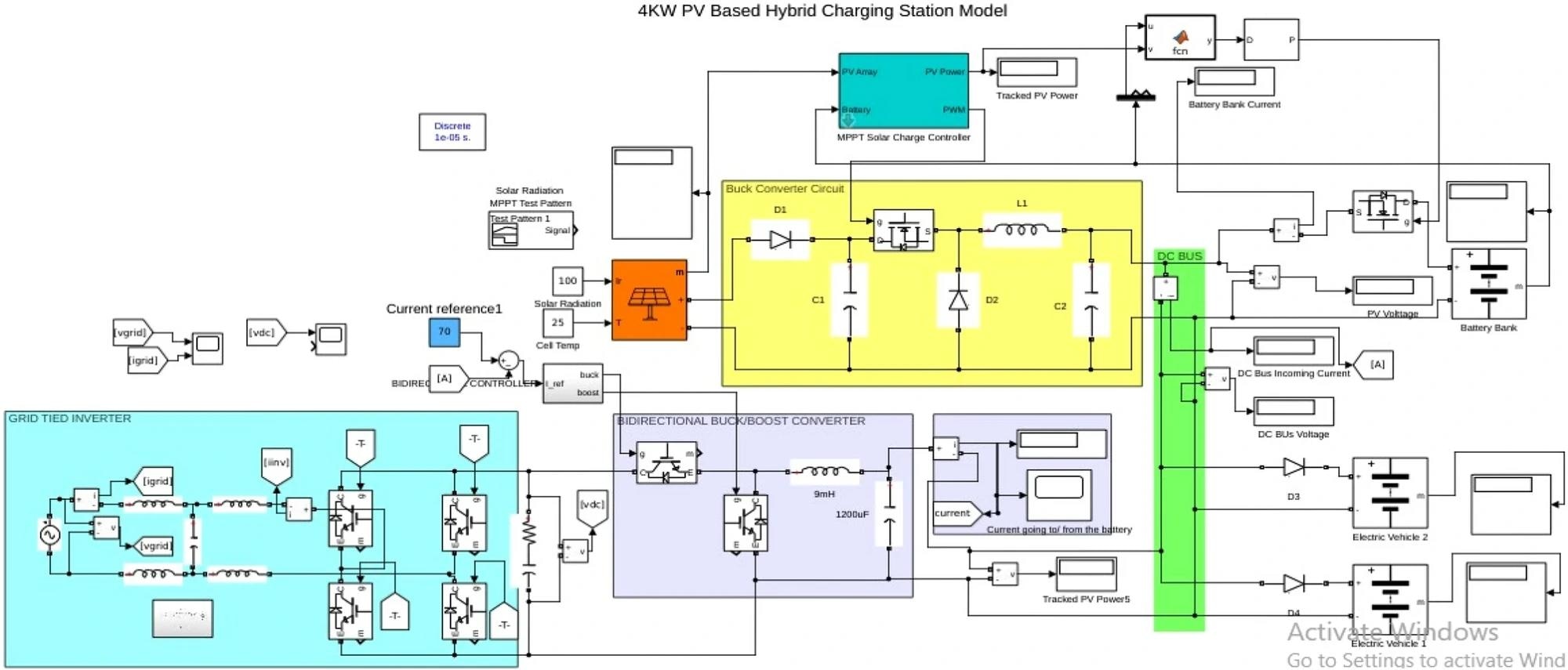In an article published in the journal Scientific Reports, researchers from India and Ethiopia developed an innovative hybrid electric vehicle (EV) charging station by integrating solar power and battery energy storage (BES). Their system aims to meet the growing demand for EVs by offering an efficient, sustainable, and uninterrupted power supply for EV charging while simultaneously reducing dependence on traditional fossil fuels and minimizing grid overload.
 Study: Design and simulation of 4 kW solar power-based hybrid EV charging station
Study: Design and simulation of 4 kW solar power-based hybrid EV charging station
Background
EVs are rapidly transforming the automotive landscape, promising reduced emissions and a cleaner environment. However, their success depends on the availability of convenient and efficient charging stations. Traditional grid-based stations face challenges like peak demand, grid stability, and reliance on fossil fuels. To address these issues, researchers have explored alternative approaches, including solar-powered charging stations.
Solar photovoltaic (PV) systems directly convert sunlight into electricity, making them an attractive option for sustainable energy generation. By harnessing solar power, EV charging stations can reduce their reliance on fossil fuels and contribute to a greener future. However, designing an effective solar-based charging station requires careful consideration of various factors, including energy availability, storage capacity, and system efficiency.
In essence, EVs represent a positive shift towards sustainability, but the infrastructure supporting them must evolve. Solar charging stations offer a promising solution, harnessing renewable energy to power vehicles while minimizing environmental impact.
About the Research
In the present paper, the authors focused on the design and simulation of a 4-kW solar power-based hybrid EV charging station. They developed a sustainable and efficient charging solution for EVs by seamlessly integrating solar energy into the charging infrastructure having BES. This architectural approach guaranteed continuous power availability for EVs, even during periods of limited solar energy generation.
The proposed charging station implements a three-stage strategy, which includes solar panels, BES, and grid electricity. In the first stage, solar panels capture sunlight and convert it into electrical energy. This energy was used to power the charging station and charge the EVs.
Excess solar energy in the second stage was stored in batteries for later use. This BES system ensured that energy was available even when solar generation was insufficient. In the third stage, when solar energy was inadequate, the charging station drew power from the grid to continue charging the EVs, maintaining uninterrupted service.
To optimize the performance of the hybrid charging station, the researchers utilized maximum power point tracking (MPPT) algorithms. MPPT algorithms were employed to track the point of maximum power output from the solar panels, ensuring that the charging station operated at peak efficiency levels. Various MPPT methods were explored to enhance the charging station's performance and maximize energy conversion.
The researchers also conducted simulations using MATLAB to evaluate the effectiveness of the hybrid charging station. These simulations validated the capabilities of the system in providing uninterrupted power for EVs. Performance metrics such as charging efficiency, grid interaction, and battery utilization were assessed to determine the overall effectiveness of the charging station.
Research Findings
The outcomes showed that the newly presented hybrid charging station demonstrated its ability to address the challenges associated with grid stability and EV charging demands. Through the integration of solar power and BES, it reduced dependence on traditional fossil fuels, promoting cleaner energy generation and reducing greenhouse gas emissions.
Moreover, the station's intelligent three-stage charging strategy, combined with MPPT techniques, guaranteed a steady power supply for EVs, optimizing energy utilization and enhancing efficiency. Additionally, its ability to accommodate 10-12 EVs with 48 V 30 Ah lithium-ion batteries highlighted its scalability and practicality. Lastly, surplus solar energy could be exported back into the grid, benefitting the broader energy ecosystem and encouraging the adoption of renewable energy sources.
The paper has significant implications for the future of EV charging infrastructure. The authors suggested that hybrid charging stations could play a crucial role in promoting sustainable transportation by harnessing renewable energy sources. Furthermore, it can serve as a blueprint for the development and implementation of similar hybrid charging stations across various geographical settings. Such initiatives stood to significantly support the uptake of EVs and renewable energy sources, thereby fostering a more environmentally conscious and sustainable energy ecosystem on a global scale.
Conclusion
In summary, the research effectively underscored the significance of integrating solar power and EV technology to address environmental challenges and promote sustainable energy practices. The authors provided a foundation for the development of larger-scale hybrid charging stations. Moreover, integrating solar power and BES can be expanded to accommodate higher power demands and larger numbers of EVs.
The researchers acknowledged limitations and challenges and proposed directions for future work. They recommended further investigation into enhancing the scalability of the hybrid EV charging station to accommodate larger power capacities. Additionally, they suggested exploring advanced energy management strategies to optimize solar energy utilization and battery storage efficiency. Furthermore, they proposed conducting field tests and real-world implementations to validate the system's performance under varying conditions and assess its practical feasibility.